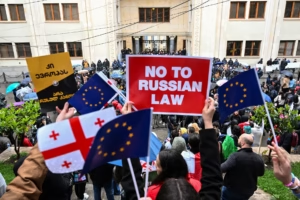President Yoon Suk Yeol of South Korea unexpectedly declared martial law in the country for the first time in 50 years, prohibiting political activities and gatherings by the National Assembly and suppressing free press.
On December 3rd, at around 11 pm (KST), South Korea’s current president Yoon Suk Yeol appeared on an unannounced live television broadcast and declared martial law in the country. The reasoning behind this decision was the president’s intention to “protect the free republic of Korea from the threat of North Korean communist forces, to eradicate the despicable pro-north Korean anti-state forces that are thundering the freedom and happiness of our [Korean] people, and to protect the free constitutional order”.
Right after this announcement, the Seoul Metropolitan Police Agency issued the second-highest emergency response order, which urged police commanders and senior officers to remain in their positions and maintain emergency contact. The members of the National Assembly rushed to the parliamentary grounds to vote against martial law, some of them even jumping over the barricades set up by the police to enter the voting chamber.
Two battalions, consisting of about 250 soldiers in total were deployed to the National Assembly and ordered “to take lawmakers out of the [National Assembly] even if that means breaking doors”, to “ block them from voting on the motion.”
The public perception of the situation, influenced by the memories from the last martial law period in the country, was also negative. In May 1980, when martial law was declared, South Korea was under the rule of Chun Doo-Hwan, who came to power through a military coup. During the protests against his ruling, hundreds of people were killed, injured, and detained, leaving a huge scar on the nation. However, despite the late hour, this around citizens too gathered to protest martial law and demand its lifting. Police forces detained political opposition members and protestors, however the situation did not escalate due to its early resolution.
At around 1 am (KST), all 190 present members of the National Assembly voted to overturn martial law. In accordance with South Korean law, at around 5 am (KST), the president lifted martial law. This incident was registered as the shortest period of martial law in history, totaling 157 minutes actively in effect and 6 hours of total span.
Although the martial law term was over, there were still consequences to come for President Yoon Suk Yeol. On December 4th, opposition lawmakers tabled the motion of impeachment of President Yoon, accusing him of imposing martial law to evade investigations. Cha Ji Ho, an opposition MP from the Democratic Party expressed his opinion about this matter: “President Yoon’s authoritarian tendencies are deeply worrying. He makes decisions without consulting his Cabinet or the ruling party. It’s becoming more about personal power than governance”.
On the morning of December 7th, a few hours before the vote took place, President Yoon apologized to the nation in his speech, stating that he made the decision out of desperation and that he was very sorry to surprise the citizens.
South Korean law states that in order for the President to be suspended, 2/3 of the National Assembly should vote in favor of the impeachment. After, in a period of six months the Constitutional Court has to confirm the impeachment for the president to be removed from office. The National Assembly of South Korea consists of 300 seats, 192 of which are taken by the opposition and the remaining 108 seats belong to President Yoon’s party – People Power Party.
The PPP party lawmakers walked out from the vote, boycotting the impeachment and the opposition was not able to pass the vote. From the 200 votes required to suspend the President, only 195 were fulfilled, thus the President was able to survive this voting.
A couple of conclusions can be drawn from this situation. Firstly, the democratic party in the country is very fragile, as despite holding most of the seats in the parliament, they were not able to win the vote against the President’s party. Secondly, the political polarization in the country is profound and evident, indicating instability and challenges in governance, evidenced by the resignation and arrest of former defense minister Kim Yong Hyun in the days following the declaration of martial law. Lastly, the rapid revocation of martial law demonstrates the power of public response in South Korea and yet again highlights the importance of the protection of civil liberties by the government.
Featured Image by Korea JoongAng Daily, 2024







